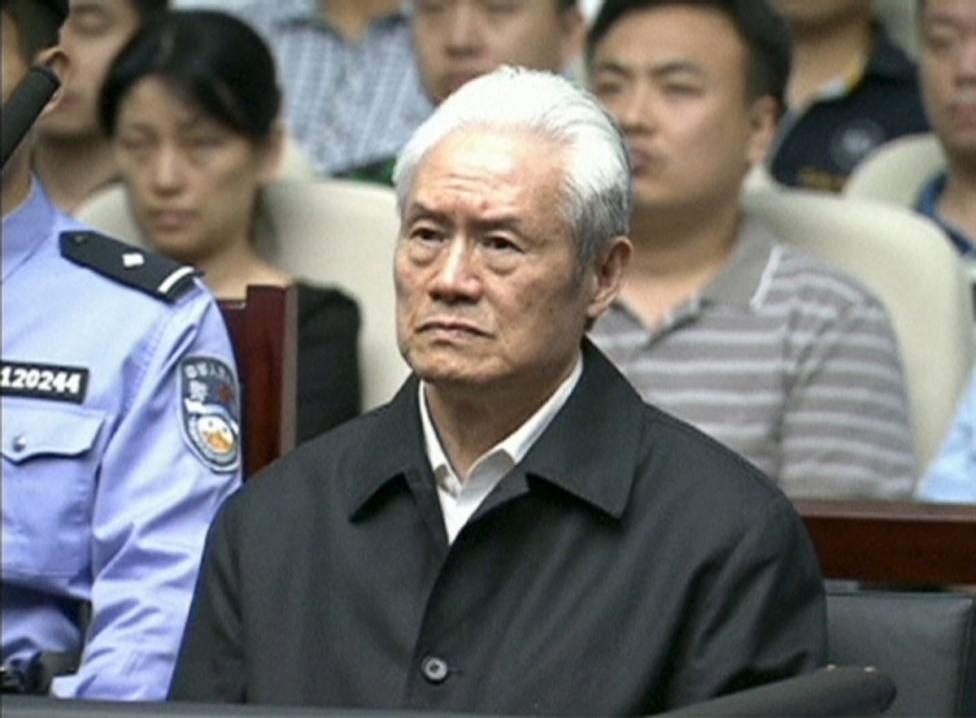
(TibetanReview.net, Jun13, 2015) – China has jailed for life on Jun 11 its former state security chief Zhou Yongkang after finding him guilty of accepting bribes, abusing his power and deliberately disclosing state secrets. The official Xinhua news agency Jun 11 called his trial a symbol of the Communist Party of China’s commitment to the rule of law.
The report said the Tianjin Municipal No. 1 Intermediate People’s Court, which had begun hearing his case on May 22, also deprived the 73-year-old disgraced former top leader of his political rights for life and had his personal assets confiscated.
The report said Zhou’s trial was held behind closed doors as it involved disclosure of state secrets. It added that Zhou pleaded guilty and will not appeal. A picture on state media websites showed a gaunt-looking, white haired Zhou hearing the verdict.
Zhou was formerly a member of the Standing Committee of the Political Bureau of the Communist Party of China (CPC) Central Committee, China’s most powerful decision making body, and secretary of the Commission for Political and Legal Affairs of the CPC Central Committee, with his ministry commanding a budget higher than that for national defence. He was the boss of the country’s internal security, including police, courts, jails and domestic surveillance.
“There are no privileged members in front of CPC discipline. There is no privileged citizen in front of the law,” an editorial comment by People’s Daily, the CPC newspaper, was quoted as saying, applauding Zhou’s trial and conviction. “No matter how much power one holds or how high one’s position, one will surely be severely punished for violating Party discipline and state laws.”
The judgement was cited as saying Zhou was convicted of accepting bribes of about 130 million yuan (21.3 million US dollars) and instructing Jiang Jiemin and Li Chuncheng, also senior officials, to assist in the business activities of others, helping them to illegally obtain about 2.14 billion yuan and causing losses to the state of 1.49 billion yuan.
Although Zhou had taken “particularly huge bribes,” he had confessed, pleaded guilty and repented his wrongdoing. The majority of the money was accepted by his relatives, without his prior knowledge. Zhou asked his relatives to return their illegal gains. All gifts and cash have now been recovered. These actions constitute “legal and discretionary grounds for lesser punishment,” the report further cited the judgement as saying.
The court was also cited as saying Zhou’s abuse of power and deliberate disclosure of state secrets were “particularly grave,” but his disclosure of state secrets “did not have very serious consequences.” He was found to have leaked five “extremely confidential” documents and one “confidential” document to Cao Yongzheng, an unauthorized person, directly contravening the State Secret Law. Cao Yongzheng was described in reports as a fortune-teller and practitioner of a mysterious Chinese martial art known as “Qigong”.
Although Zhou was no doubt corrupt, like many other top leaders, who will, however, probably never be investigated, his trial is seen by many as nothing more than an excuse for political witch-hunting. Zhou is the highest ranking Chinese official to be sentenced in court since the infamous Gang of Four – including former leader Mao Zedong’s widow Jiang Qing – were put on trial and blamed for the chaos of the Cultural Revolution, noted an AFP commentary Jun 11.
Zhou, the biggest tiger in Xi’s campaign to go after both “big tigers” and “small flies” in his anti-corruption campaign, had a humble origin, with his father being an eel farmer.


